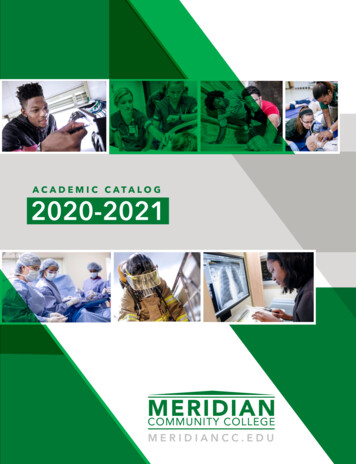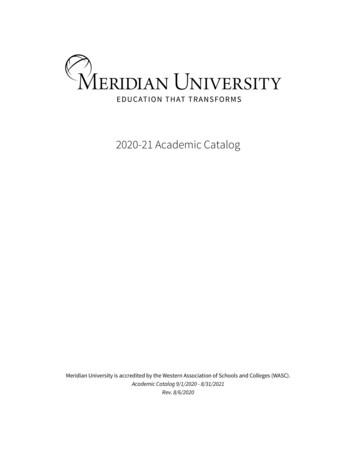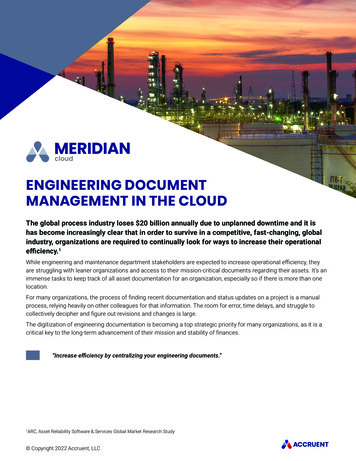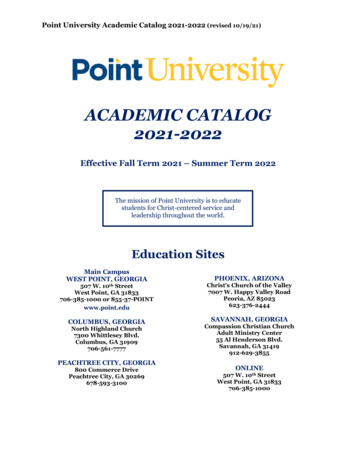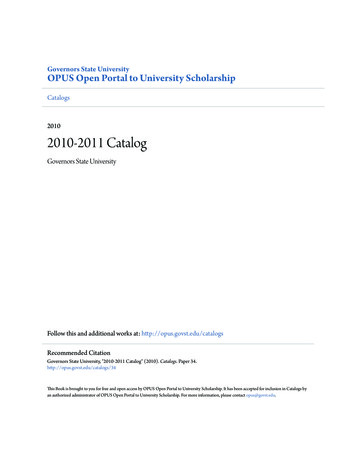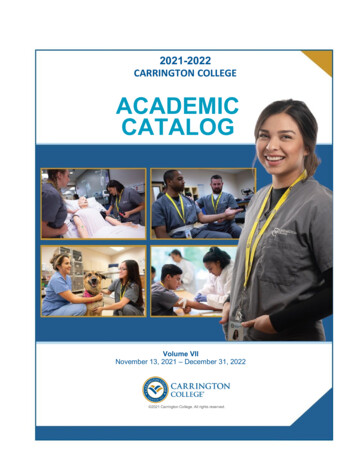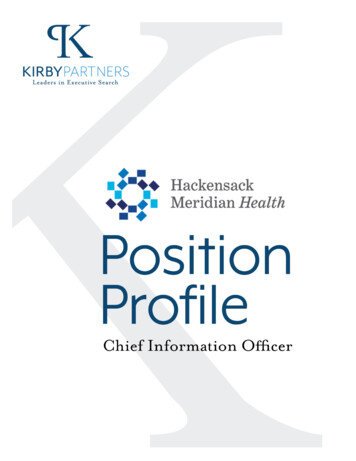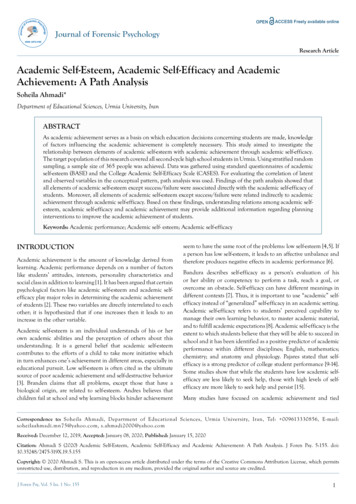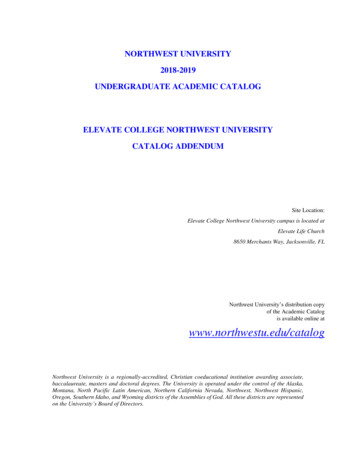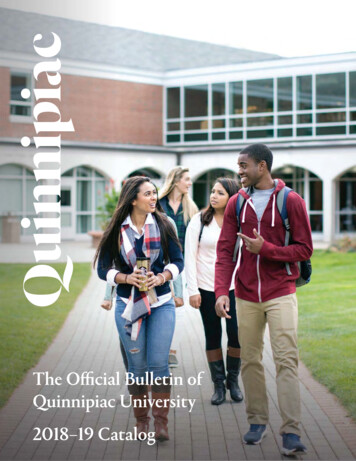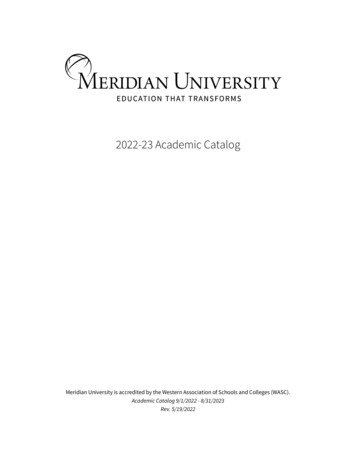
Transcription
2022-23 Academic CatalogMeridian University is accredited by the Western Association of Schools and Colleges (WASC).Academic Catalog 9/1/2022 - 8/31/2023Rev. 5/19/2022
2022-23 Academic CatalogTable of ContentsABOUT MERIDIAN UNIVERSITY. 5TRANSFORMATIVE LEARNING . 5LEARNING FORMAT . 6ACADEMIC PROGRAMS OVERVIEW . 7MBA IN CREATIVE ENTERPRISE . 8CONCENTRATIONS . 10BUSINESS COURSE DESCRIPTIONS . 11MEd IN EDUCATIONAL LEADERSHIP . 25EdD IN ORGANIZATIONAL LEADERSHIP. 27CONCENTRATIONS . 28EDUCATION COURSE DESCRIPTIONS . 29PSYCHOLOGY PROGRAM OVERVIEW . 47PSYCHOLOGY FIELDWORK REQUIREMENT. 50MA IN PSYCHOLOGY . 51MA IN COUNSELING PSYCHOLOGY . 52PREPARATION FOR CALIFORNIA MARRIAGE & FAMILY THERAPY LICENSURE . 52PREPARATION FOR CALIFORNIA PROFESSIONAL CLINICAL COUNSELOR LICENSURE . 54PsyD IN CLINICAL PSYCHOLOGY . 55PREPARATION FOR PSYCHOLOGIST LICENSURE . 55PhD IN PSYCHOLOGY. 57PREPARATION FOR PSYCHOLOGIST LICENSURE . 57CONCENTRATIONS . 59PSYCHOLOGY COURSE DESCRIPTIONS . 60CERTIFICATES . 94FACULTY . 94LOCATIONS . 100SAN FRANCISCO BAY AREA CENTER . 100LOS ANGELES CENTER . 1001
2022-23 Academic CatalogBERLIN CENTER . 101ATHENS CENTER . 101JOHANNESBURG CENTER . 101SHANGHAI CENTER . 101ACADEMIC AND ADMINISTRATIVE INFORMATION . 102LEARNING RESOURCES . 102ACCESS TO COMPUTER RESOURCES. 103PRACTICE GROUPS . 104RESEARCH ETHICS AND INSTITUTIONAL REVIEW BOARD . 104ACADEMIC FREEDOM POLICY . 105NON-DISCRIMINATION POLICY . 105LAB REQUIREMENTS FOR STUDENTS RESIDING IN SPECIFIC US STATES . 106CAMPUS SECURITY POLICY . 106VACCINATION POLICY. 107DISABILITY ACCOMMODATION POLICY . 107STUDENT RECORDS AND RETENTION OF STUDENT RECORDS POLICY . 107CREDIT HOUR POLICY . 108EVALUATION OF STUDENTS POLICY . 108SATISFACTORY ACADEMIC PROGRESS POLICY . 109MAXIMUM TIMEFRAME. 115ADVANCEMENT TO CANDIDACY POLICY . 117ATTENDANCE POLICY . 118LEAVE OF ABSENCE POLICY . 119WITHDRAWAL . 123INTEGRITY POLICY . 124PEER-TO-PEER FILE SHARING, INTELLECTUAL PROPERTY AND COPYRIGHT POLICIES . 125COPYRIGHT INFRINGEMENT . 125PEER-TO-PEER FILE SHARING . 127INTELLECTUAL PROPERTY POLICY . 127DRUG AND ALCOHOL POLICY . 1302
2022-23 Academic CatalogCONCENTRATION FRAMEWORK . 135MULTIPLE ROLES POLICY . 135SEXUAL HARASSMENT POLICY . 137HARASSMENT, INTIMIDATION, BULLYING, AND DISCRIMINATION POLICY . 138ACADEMIC PROBATION POLICY . 141ADMINISTRATIVE WITHDRAWAL POLICY. 141CONFLICT RESOLUTION PROCESS AND GRIEVANCE PROCEDURE. 142FINANCIAL INFORMATION . 143PAYMENTS . 143PAYMENT PLANS AND DUE DATES . 144CREDIT BALANCES. 145MORE INFORMATION . 145FINANCIAL AID . 146STUDENT CONSUMER INFORMATION DISCLOSURES . 150STUDENT LOAN COUNSELING . 150GENERAL ELIGIBILITY CRITERIA: HOW DO I QUALIFY? . 150SATISFACTORY ACADEMIC PROGRESS . 152POST-COURSEWORK STATUS . 152NON-DISCRIMINATION POLICY . 152COST OF ATTENDANCE . 152UNDERSTANDING CREDIT . 153SCHOLARSHIPS . 154FINANCIAL AID RESOURCES FOR STUDENTS WITH DISABILITIES . 154INTERNATIONAL STUDENTS . 154PRIVATE ALTERNATIVE EDUCATION LOANS . 156GLOSSARY OF FINANCIAL AID TERMS . 158NON-DISCRIMINATION POLICY . 160STUDENT’S RIGHT TO CANCEL . 160REFUNDS . 161ADDITIONAL REFUND INFORMATION . 1623
2022-23 Academic CatalogRETURN OF FEDERAL FUNDS POLICY (R2T4) . 1632022-23 SCHEDULE OF CHARGES . 169COST OF ATTENDANCE . 174NOTE REGARDING LOANS . 177ADMISSIONS INFORMATION . 177APPLYING TO MERIDIAN . 177TRANSFER CREDIT . 179INTERNATIONAL STUDENTS . 180MORE INFORMATION AND RESOURCES . 181ACCREDITATION AND APPROVAL. 182NOTICE OF DISCLAIMER . 1854
2022-23 Academic CatalogABOUT MERIDIAN UNIVERSITYFounded 30 years ago in the San Francisco Bay Area, Meridian University enrolls students globally inits unique hybrid and 100% online graduate degree, certificate, and public programs. The Universityoffers master's and doctoral programs in Psychology, Education and Business with diverseconcentrations available within each of these programs. Meridian’s integrated, innovative curriculumis designed to be experiential and transformative.Meridian graduates are engaged in varied professional contexts that include coaching, psychotherapy,organizational development, facilitation, social entrepreneurship, and transformative leadership.Meridian’s graduate programs are available in two formats, hybrid and 100% online. This modelsupports students who are working professionals and balancing other life commitments to moveforward towards their personal and professional future.Meridian is accredited by the WASC Senior College and University Commission and approved by theUS Department of Education for participation in the Federal Student Aid program. WASC is theDepartment of Education-recognized regional accreditor for such schools as the University ofCalifornia at Berkeley, UCLA, and Stanford University. Meridian’s licensable degrees have beenrecognized by the California Board of Behavioral Sciences and Board of Psychology for over 25 years.TRANSFORMATIVE LEARNINGEngaging Transformative Learning entails shifts in perspectives, core beliefs, habits, assumptions,schemas, mental models, and mindsets. A major purpose of Transformative Learning is for thestudent to become more capable of engaging complex challenges and collaborations, as well as moreaccelerated and integrated Informational Learning. Transformative Learning transforms how thelearner perceives the world, how the learner inhabits and functions in the world, and how the learnerengages the world, to transform it.Transformative Learning is learning that goes beyond acquiring information and skills, towardsdeveloping individual and system capabilities. This is a shift from having information and skills tobeing capable. Such learning entails a shift in perceptual lenses, enabling individuals and systems toinhabit new and more complex emergent landscapes.TRANSFORMATIVE LEARNING COMMUNITYA transformative learning community catalyzes experiences which are transformative and integrative.Transformative learning supports the inherently active and social nature of knowledge. Learning howto learn is at the heart of this approach.5
2022-23 Academic CatalogWhen transformative learning is practiced in a supportive community, we are able to inhabitvulnerability and mystery. Through the recognition of each other’s unique potentials and limitations,a collective process of creative inquiry unfolds. This approach builds relationships with reciprocityand mutuality; it is especially suited to the transformative dimensions of adult learning.TRANSFORMATIVE LEARNING IN HIGHER EDUCATIONWithin higher education, both students and faculty are under intense pressure to acquire and transmitever-increasing information. These circumstances result in a focus on competencies associated withinformational learning. However, the performance deficiencies of higher education graduates asprofessionals suggests that something vital is missing. The future calls for integrated competenciesthat enable professionals to acquire and manage vast domains of information effectively enough toparticipate in wise and creative initiatives. Transformative Learning prepares graduates for thischallenge.At Meridian, care and attention have been given to the how of teaching and learning, as well as onwhat information should be transmitted. It is clear that in order for transformative learning to flourish,a well-sealed and supportive container is required. Toward this intent, Meridian has chosen particularformats and practices in constructing its learning environment.LEARNING FORMATAll of Meridian's degree programs are offered in a hybrid format. Each quarter, students take one ormultiple seven-week online courses. This adds up to 28 weeks a year -- just about half the year thatcourses are actively running. This gives students a break between quarters to rest and prepare.ONLINE COURSEWORKOnline coursework is primarily conducted asynchronously, providing students the opportunity toparticipate in collaborative learning with faculty and fellow students during times that are convenientfor personal schedules. Faculty do encourage their online classes to meet synchronously (virtually,but in real-time), so as to have real-time contact outside of residencies; however, while real-timeattendance is encouraged, it is not required. At times students are asked to meet in virtual smallgroups at mutually convenient times. Meridian faculty and staff collaborate to provide an onlinelearning experience for students that invites new and unexpected meanings to emerge.FACULTY RESPONSE TIME6
2022-23 Academic CatalogFaculty respond to students’ work (weekly lessons, projects, or doctoral project submittals) withintwo to 30 working days, depending on the nature of the assignment.CLASSROOMS AND MEETING SPACEAll classrooms and meeting spaces are equipped with either built in or mobile AV equipment whichincludes a computer, projector, multimedia players, projection screens, whiteboards, table, chairs,and markers. Table and chairs are also provided for all instructional spaces. Students are expected tonotify staff of any equipment needs.COURSEWORK FORMAT AVAILABILITYTransformative Learning Lab location and schedule may vary by course and quarter.Students who reside outside of California but inside the United States may be required to completeresidential labs each academic year inside California depending on their state of residence.ACADEMIC PROGRAMS OVERVIEWMeridian University offers graduate degree programs that educate students to engage the professionsof Psychology, Business, and Leadership in creative and transformative ways. These degree programsprovide a cumulative, emergent, and integrated curriculum, empowering the student’stransformation both personally and professionally.DEGREE PROGRAMSBUSINESS MBA in Creative EnterpriseEDUCATION MEd in Educational Leadership EdD in Organizational LeadershipPSYCHOLOGY MA in Psychology MA in Counseling Psychology PsyD in Clinical Psychology PhD in PsychologyACADEMIC YEAR7
2022-23 Academic CatalogDepending on the program and program year, approximately 300-370 classroom hours(approximately 30-37 quarter credits) are completed each academic year. The academic year beginsSeptember 1st and ends August 31st.INSTITUTIONAL LEARNING OUTCOMESEach degree program at Meridian University entails learning objectives that implement the followingInstitutional Learning Outcomes:1. LEADERSHIP CAPACITIESStudents will cultivate leadership capacities aligned with the specific profession that is the focus ofthe degree program.2. CREATIVE INQUIRY SKILLSStudents will develop creative inquiry skills aligned with the specific profession that is the focus of thedegree program.3. PROFESSIONAL KNOWLEDGEStudents will acquire professional knowledge specific to the focus of the degree program.MBA IN CREATIVE ENTERPRISEMBA IN CREATIVE ENTERPRISE DEGREE OVERVIEWThe MBA in Creative Enterprise is located at the intersection of three primary emphases: Transformative InnovationGenerative Entrepreneurship and Cultural LeadershipApplied Wisdom and Sustainability: Regenerating the CommonsEDUCATIONAL OBJECTIVES FOR THE MBA IN CREATIVE ENTERPRISE1. Cultivating Leadership Capacities: To cultivate the leadership capacities that furthertransformative and ethical engagement within business and cultural contexts.2. Practicing Creative Action Inquiry: To develop creative inquiry skills that enable collaborationresponsive to high complexity and ambiguity.8
2022-23 Academic Catalog3. Core Business Functions: To identify and implement business methods and practices of humanresources, operations, economics, finance, accounting, marketing, management, andstrategy, towards building and sustaining a creative enterprise.4. Generative Entrepreneurship and Transformative Innovation: To develop the practices andperspectives that link entrepreneurial competencies with impacting the commons in waysthat are generative and emancipatory, and to ignite individual and collective creativity togenerate emancipatory, disruptive, and transformative innovations.5. Transforming Business as a Profession and Regenerating the Commons: To developcompetencies required to conceive, build, and lead creative and emancipatory enterprises; toapply the competencies associated with generative entrepreneurship to producing generativeglobalization in service of thriving local communities, restoration of the earth’s resources, andregenerating the commons.MBA IN CREATIVE ENTERPRISE PROGRAM LEARNING OUTCOMES1. Reflexivity: Skillful and embodied self-awareness2. Empathy: Depthful understanding of the other’s needs and circumstances on multiple levels,states, and life circumstances.3. Collaborativity: The capacity to associate with others in ways that foster individuality,autonomy, complexity, dependability, and reciprocity.4. Collaboration Skills: Skills that enable creative responses to challenges entailing highcomplexity, uncertainty, and ambiguity in organizational and business contexts.5. Culture: Knowledge of stories and values that constitute how culture shapes individual andcollective experience within business, from the micro (individual business) to the macro(global business cultures), and the role of cultural innovation in cultural leadership andtransformative innovation.6. Social Justice and Diversity: Identify the consequences and antecedents of injustice andoppression in cultural, business, and human resource contexts, informed by transdisciplinaryperspectives.9
2022-23 Academic Catalog7. Core Business Functions: Identifying and implementing business methods and practices ofhuman resources, operations, economics, finance, accounting, marketing, management, andstrategy towards building and sustaining a creative enterprise.8. Producing Transformative Innovation: Competencies for individual creativity and forigniting the dynamics of collective creativity to generate emancipatory, disruptive, andtransformative innovations designed to impact both the whole person and whole-system.9. Generative Entrepreneurship: Practices and perspectives that link entrepreneurialcompetencies with impacting the commons, in ways that are generative and emancipatory.10. Regenerating the Commons: Applying the competencies associated with generativeentrepreneurship to producing generative globalization, in service of thriving localcommunities, global justice, and restoration of the earth’s resources.11. Transforming Business as a Profession: Competencies to conceive, build, and lead creativeand emancipatory enterprises that serve to regenerate the commons, enhancingsustainability and social justice.GRADUATION REQUIREMENTS FOR THE MBA IN CREATIVE ENTERPRISE Students are required to complete 64 credits (640 hours).Students are expected to engage in a ‘Creative Action Practicum’ with a business ororganization, over a period of two quarters.Students are expected to complete a Creative Action Project (capstone).Students have a maximum of five years from the initial date of enrollment to complete thisdegree.CONCENTRATIONSStudents in Meridian’s Business program can elect a concentration. Please see Meridian's website forfurther information.10
2022-23 Academic CatalogBUSINESS COURSE DESCRIPTIONSMBA 501FOUNDATIONS OF CREATIVE ENTERPRISEA spirit of enterprise is emerging locally and globally in response to complex crises and new,technologically-enabled opportunities. This course offers an Integral vision of, and approach to,creative and generative enterprise. Regenerating the Commons, Transformative Innovation, andGenerative Entrepreneurship are the foundations of creative enterprise. During this course, studentswill apply the principles and practices associated with these foundational pillars to designing thebusiness models that are at the core of any creative enterprise. Such business models integratetechnological, social, and cultural innovations requiring integrated competencies of those who wouldmanage and lead creative enterprise. (4 credits)MBA 511OPERATIONS MANAGEMENTA clear understanding of operations management is essential to building and maintaining asustainable business. There are a wide range of opportunities to improve a company’s operations,from worksite safety and employee training to product development. It is particularly critical as theemerging creative economy seeks to harness increased cultural diversity and creative talent amongour workforce, both locally and globally. This course covers topics such as process analysis, supplychain management, quality, and facilities management. Additional topics reviewed include conceptsof probability, statistics and optimization applied in operations management tools, process mappingand production technologies, as well as materials use and reuse introduced through industrialecology. (4 credits)MBA 521CREATIVE MARKETINGThe marketing management process is critical to positioning an organization as a key contributor to asustainable market in an emerging creative economy. It requires the ability to thoroughly analyzemarket strategies in order to make decisions that positively impact the organization and society as awhole. This course approaches marketing strategy and frameworks, trends, concepts, and marketingtechniques in relation to today’s individual, organizational, and societal needs. Some of the topics tobe covered include research, target market and segmentation, societal and cause-related marketing,green marketing, and branding. (4 credits)MBA 530STRATEGIC MANAGEMENTThe evolution taking place in market strategy is creating a business consciousness that is socially andenvironmentally sensitive as part of an organization’s fundamental makeup. Trends are continuallyemerging, providing opportunities to develop new strategies and revise organizational processes and11
2022-23 Academic Catalogstructures that are more sustainable. This course will give an overview of different market strategytechniques, providing a framework for the internal processes and structures needed to supportsustainable organizations in times of economic volatility and change. In this context, sustainabilitybecomes, by definition, good business strategy. (4 credits)MBA 532HUMAN RESOURCES AND ORGANIZATIONAL CULTUREHuman Resources is uniquely positioned to support the underpinnings of organizationaltransformation when considered an essential player on the executive leadership team. Withoutcritical input and support from Human Resources, organizations are prone to marginalizing keyimplementation strategies and minimizing success due to obstacles such as change resistance andemployee/managerial sabotage. This course looks at areas of sustainable organizations in whichHuman Resources can play a significant role. These areas include leadership development, trainingand development, change management, conflict facilitation, ethics and governance, diversity, andteamwork. (4 credits)MBA 564MANAGERIAL FINANCEThe key to managing organizations more sustainably is to communicate the principles and conceptsof business finance to a larger audience. In turn, this provides the foundation for a persuasivebusiness case supporting socially responsible investing. This course covers financial analysis andmanagement in relation to areas such as financial ratios, assets and liabilities, financial planning andforecasting, assessing, and managing risk. Additional topics such as time-value of money, financialmarkets and instruments, and socially responsible investment (SRI) will be explored. (4 credits)MBA 565MANAGERIAL ACCOUNTINGEffective managers in any industry need to be equipped with the knowledge and understanding ofaccounting in order to make business decisions that sustain a company through prosperous as well aslean times. Understanding account
2022-23 Academic Catalog 8 Depending on the program and program year, approximately 300-370 classroom hours (approximately 30-37 quarter credits) are completed each academic year. The academic year begins September 1st and ends August 31st. INSTITUTIONAL LEARNING OUTCOMES
